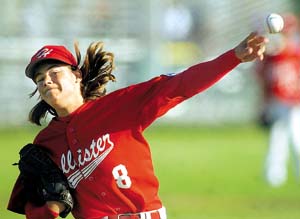His office has four-wheel drive and his ilk is becoming extinct,
but thousands of San Benito County’s largest beasts depend on his
services. Jeff Moss, 30, is a large animal veterinarian. That makes
him a doctor, dentist, pharmacist, surgeon, and psychiatrist
– of a sort. And he makes house calls.
Hollister – His office has four-wheel drive and his ilk is becoming extinct, but thousands of San Benito County’s largest beasts depend on his services. Jeff Moss, 30, is a large animal veterinarian. That makes him a doctor, dentist, pharmacist, surgeon, and psychiatrist – of a sort. And he makes house calls.
Dr. Moss drives his mobile office to far flung barns and stables all over the county – places cellular phones don’t always work and patients don’t always keep still for shots.
“Horses are just like people, some are good with needles and others aren’t so good,” Moss said.
When Moss met Justice he didn’t have to explain what he was about to do. Moss simply let the former police horse smell his hand. Then Moss stroked his neck with some anesthetic and swiftly injected a $26 West Nile vaccine. Justice flinched slightly, but didn’t seem to mind. Other horses, Moss said, are not so cooperative. The trick with needle-shy horses is to stick the needle in first, then attach the syringe, he said.
Injecting vaccinations was the easy part of the job at the Union Heights Equestrian Center. Getting a horse to stand still for a quick shot is simple, but getting a horse to open its mouth for dental work is much more difficult.
In order to file Cowboy’s teeth, Moss injects him with a fast-acting sedative that has Cowboy’s head drooping in seconds. Then it’s time for the real work.
Moss, who recently graduated from the University of California at Davis, explained that horses have wider lower jaws than upper jaws, which sharpen the inside of their lower and outside of their upper teeth. Moss must file Cowboy’s teeth, a process called “floating,” to keep the horse’s teeth from “hooking,” which makes eating painful. The procedure can range from $95 to $200 depending on teeth conditions.
Moss goes to his truck for tools. He has files the length of his forearm, scary enough to make a seasoned human dentist cringe. Horses have extremely hard teeth that never stop growing and Moss is sweating after filing Cowboy’s teeth for 20 minutes. After he gives Cowboy’s mouth a good rinse with a mixture Moss calls “mouthwash without the mint flavor,” it’s off to the local Future Farmers of America barn at San Benito High School to check on a student’s lamb.
Gloria Brigantino is new to FFA, but she’s been working with animals for most of her life. She knew right away that something was wrong with her lamb after it cut its hind leg on a fence. Moss examines the wound and makes a quick trip to truck. He returns with a surgical razor, opens the wound and flushes it out with a small plastic syringe containing a mixture of water and betadine.
Moss’s father taught agriculture at a high school near San Diego, so he’s familiar with FFA. He knows the fair is coming up and students need healthy animals in order to get blue-ribbons.
Leaving Brigantino with detailed instructions for flushing out the wound and caring for the wounded lamb, Moss returns to his truck to wash the blood from his hands with soap and a spray nozzle.
“Blood never bothered me much,” Moss said.
Moss is one of very few vets who specialize in large-animals. He said 80 percent of students who become doctors of veterinary medicine work with small animals. Low salaries, odd hours and extensive education have contributed to the shrinking number of large animal vets. Of the 122 students in his class, only 15 specialized in large animals. There’s so much ground to cover that Moss compared his vet school experience to drinking out of a fire hose. He said his wife and kids helped keep him focused.
After graduation, Moss was contacted by local vet Charlie Tobias and offered a job in Hollister. Tobias, who has hundreds of clients, was swamped and had stopped taking on new clients for two years before he hired Moss a month ago to help him out. The number of large animal vets has been declining in the last few years and good help is often hard to find, Tobias said.
Tobias is well-known in the community and is president of the San Benito County Saddle Horse Association. He and Moss are two of the only three large animal vets in Hollister. Moss jumped at the opportunity to work with Tobias and loves his job.
“I never wanted to be stuck in an office or get sick of co-workers,” Moss said. “I love to be outdoors. When it’s beautiful outside, I’m outside.”
Moss enjoys being a member of the community and said the most rewarding part of his job is helping and being able to watch sick animals get better.
“If I wanted to make a million dollars, I chose the wrong profession,” Moss said. “But this is rewarding and I really enjoy it.”
Brett Rowland covers education for the Free Lance. He can be reached at 831-637-5566 ext. 330 or br******@***********ws.com.










